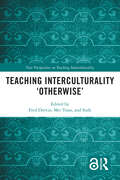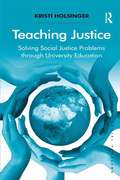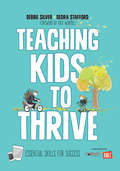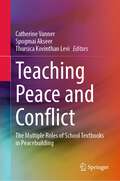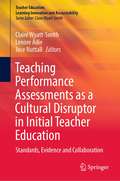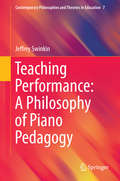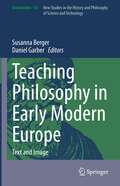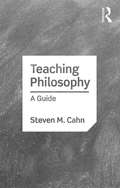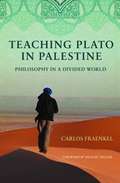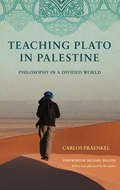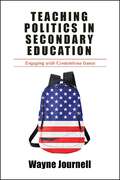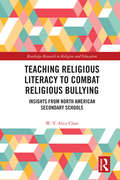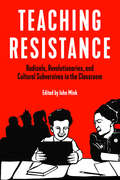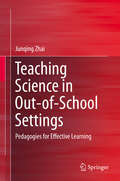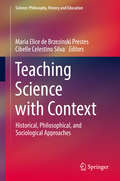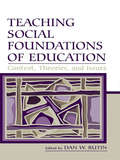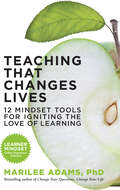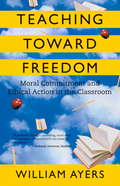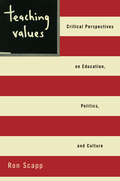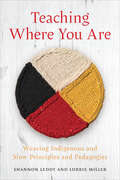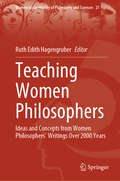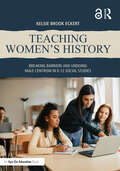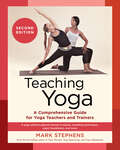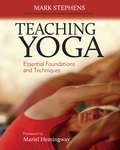- Table View
- List View
Teaching Interculturality 'Otherwise' (New Perspectives on Teaching Interculturality)
by Fred Dervin, Mei Yuan, and SudeThis edited volume focuses on the thorny and somewhat controversial issue of teaching (and learning) interculturality in a way that considers the notion from critical and reflexive perspectives when introduced to students. Comprised of three parts, the book discusses the nuts and bolts of teaching interculturally, considers changes in the teaching of interculturality, and provides pedagogical insights into interculturalising the notion. It studies both teaching im-/explicitly about interculturality and how to incorporate interculturality into teaching practices or into an institution. By sharing varied cases and theoretical reflections on the topic, the editors and contributors from different parts of the world aim to stimulate more initiatives to enrich the field instead of delimiting it, especially in complement to and beyond the 'West' or 'Global North', and also to build up further reflexivity in the way readers engage with interculturality in education. This will be a must-read for teachers and researchers of intercultural communication education at different educational levels, as well as anyone interested in scholarship on education for interculturality.
Teaching Justice: Solving Social Justice Problems through University Education (Solving Social Problems)
by Kristi HolsingerTeaching Justice explores the role that teaching and learning in higher education can play in solving problems of social injustice. Examining a range of approaches to education, it considers the challenges that exist in teaching about justice, drawing on extensive empirical data gathered amongst college lecturers and professors, as well as the author's own experience. With an analysis of the strategies commonly used this book will shed light on the manner in which students can be engaged in activism and concerned with issues of social injustice. By overcoming apathy and engaging students with social problems, education can thus address matters of injustice and begin to effect change. Presenting extensive international research and insightful analyses, Teaching Justice reveals the classroom and the lecture theatre to be important sites in the pursuit of social justice and will appeal to teachers and researchers with interests in social problems, education and educational methods, and criminal justice, as well as community engagement and service learning outside the classroom.
Teaching Kids to Thrive: Essential Skills for Success
by Debbie Thompson Silver Ms Dedra A. StaffordThere’s more to student success than standards and test scores… Integrating Social and Emotional Learning into a curriculum has been shown to increase personal and school-wide growth. With lifelong success the goal over simply meeting academic thresholds, Teaching Kids to Thrive presents strategies, activities, and stories in an approachable way to develop responsible, self-motivated learners. Uniting social, academic, and self-skills this instrumental resource offers benefits to students such as: Using mindfulness strategies to help students tap their inner strengths Learning to self-regulate and control other executive brain functions Developing growth mindsets along with perseverance and resilience Cultivating a sense of responsibility, honesty, and integrity Encouraging a capacity for empathy and gratitude
Teaching Kids to Thrive: Essential Skills for Success
by Debbie Thompson Silver Ms Dedra A. StaffordThere’s more to student success than standards and test scores… Integrating Social and Emotional Learning into a curriculum has been shown to increase personal and school-wide growth. With lifelong success the goal over simply meeting academic thresholds, Teaching Kids to Thrive presents strategies, activities, and stories in an approachable way to develop responsible, self-motivated learners. Uniting social, academic, and self-skills this instrumental resource offers benefits to students such as: Using mindfulness strategies to help students tap their inner strengths Learning to self-regulate and control other executive brain functions Developing growth mindsets along with perseverance and resilience Cultivating a sense of responsibility, honesty, and integrity Encouraging a capacity for empathy and gratitude
Teaching Peace and Conflict: The Multiple Roles of School Textbooks in Peacebuilding
by Catherine Vanner Spogmai Akseer Thursica Kovinthan LeviThis book illustrates the multiple roles of textbooks as victim, transformer, and accomplice to conflict by introducing the Intersecting Roles of Education in Conflict (IREC) framework for use in the research, development, production, distribution, and dissemination of textbooks and learning materials. The framework illustrates these three potentially overlapping roles by mapping the complex educational contexts of conflict-affected societies and considering how textbooks, learning materials, and education systems more broadly may simultaneously operate within these various roles. Country case studies from Asia, Europe, Africa, and the Middle East are used to analyze primary and secondary school textbook development, content, and application from a variety of approaches that articulate conflict as protracted and/or socio-political violence. The breadth of case studies shows how conflict discourse circulates in educational systems and materials in a wide range of contexts, indicating that the complexity of the relationship between textbooks and conflict is not unique to one culture, geographic region, or type of conflict.
Teaching Performance Assessments as a Cultural Disruptor in Initial Teacher Education: Standards, Evidence and Collaboration (Teacher Education, Learning Innovation and Accountability)
by Claire Wyatt-Smith Joce Nuttall Lenore AdieThis book explores how well teachers are prepared for professional practice. It is an outcome of a large-scale research and development program that has collected extensive data on the impact of the Graduate Teacher Performance Assessment on Initial Teacher Education programs and preservice teachers’ engagement with the assessment. It contributes to international debates in teacher education by examining an Australian experience of teacher performance assessments as a catalyst for cultural change and practice reform in teacher education. The respective chapters describe and critique this unique, multi-institutional investigation into the quality of teacher education and present substantial evidence, drawing on a variety of conceptual, empirical and methodological entry points. Further, they address the intellectual, experiential and personal resources and related expertise that teacher educators and preservice teachers bring to their practice. Taken together, they offer readers clearly conceptualised and evidence-rich accounts of site-specific and cross-site investigations into cultural, pedagogical and assessment change in Initial Teacher Education.
Teaching Performance: A Philosophy of Piano Pedagogy
by Jeffrey SwinkinHow can the studio teacher teach a lesson so as to instill refined artistic sensibilities, ones often thought to elude language? How can the applied lesson be a form of aesthetic education? How can teaching performance be an artistic endeavor in its own right? These are some of the questions Teaching Performance attempts to answer, drawing on the author's several decades of experience as a studio teacher and music scholar. The architects of absolute music (Hanslick, Schopenhauer, and others) held that it is precisely because instrumental music lacks language and thus any overt connection to the non-musical world that it is able to expose essential elements of that world. More particularly, for these philosophers, it is the density of musical structure--the intricate interplay among purely musical elements--that allows music to capture the essences behind appearances. By analogy, the author contends that the more structurally intricate and aesthetically nuanced a pedagogical system is, the greater its ability to illuminate music and facilitate musical skills. The author terms this phenomenon relational autonomy. Eight chapters unfold a piano-pedagogical system pivoting on the principle of relational autonomy. In grounding piano pedagogy in the aesthetics of absolute music, each domain works on the other. On the one hand, Romantic aesthetics affords pedagogy a source of artistic value in its own right. On the other hand, pedagogy concretizes Romantic aesthetics, deflating its transcendental pretentions and showing the dichotomy of absolute/utilitarian to be specious.
Teaching Philosophy in Early Modern Europe: Text and Image (Archimedes #61)
by Daniel Garber Susanna BergerThis book examines how philosophy was taught in the early modern period in Europe. It breaks new ground in a number of ways. Firstly, it seeks to bring text-based scholars in the history of philosophy together with social and cultural historians to examine the interaction between tradition and innovation in the early modern classroom, the site where traditional views of the world were transmitted to the generation that was to give birth to modern philosophy and science. Secondly, it draws together scholars who are centered on ideas and words with other scholars who focus on the role of images in the classroom and the intellectual world in this central period of history. The volume advances our understanding of how philosophy was understood and transmitted in this rich and crucial era. The principal audience for Teaching Philosophy are historians of science, philosophy, art, visual culture, and print culture. The chapters are written in a tone accessible to upper-level undergraduates and graduate students. It also reaches non-specialist readers interested in subjects including the “scientific revolution,” the organization of information, and Renaissance and Baroque visual art.
Teaching Philosophy: A Guide
by Steven M. CahnSome students find philosophy engrossing; others are merely bewildered. How can professors meet the challenge of teaching introductory-level philosophy so that their students, regardless of initial incentive or skill, come to understand and even enjoy the subject? For nearly a decade, renowned philosopher and teacher Steven M. Cahn offered doctoral students a fourteen-week, credit-bearing course to prepare them to teach undergraduates. At schools where these instructors were appointed, department chairs reported a dramatic increase in student interest. In this book, Cahn captures the essence of that course. Yet many of the topics he discusses concern all faculty, regardless of subject: a teacher’s responsibilities, the keys to effective instruction, the proper approach to term papers, examinations, and grades; and suggestions for how administrators should demonstrate that they take teaching seriously. Such matters are covered in the first seven chapters and in the final, fourteenth chapter. The intermediate six chapters focus on teaching introductory philosophy and, in particular, on critical thinking, free will, philosophy of religion, ethics, and political philosophy. Cahn’s writing is lucid and lively, using vivid examples and avoiding educational jargon. In sum, this book is not only a guide on how to inspire students but also an inspiration for teachers themselves.
Teaching Plato in Palestine
by Michael Walzer Carlos FraenkelTeaching Plato in Palestine is part intellectual travelogue, part plea for integrating philosophy into our personal and public life. Philosophical toolkit in tow, Carlos Fraenkel invites readers on a tour around the world as he meets students at Palestinian and Indonesian universities, lapsed Hasidic Jews in New York, teenagers from poor neighborhoods in Brazil, and the descendants of Iroquois warriors in Canada. They turn to Plato and Aristotle, al-Ghazālī and Maimonides, Spinoza and Nietzsche for help to tackle big questions: Does God exist? Is piety worth it? Can violence be justified? What is social justice and how can we get there? Who should rule? And how shall we deal with the legacy of colonialism? Fraenkel shows how useful the tools of philosophy can be--particularly in places fraught with conflict--to clarify such questions and explore answers to them. In the course of the discussions, different viewpoints often clash. That's a good thing, Fraenkel argues, as long as we turn our disagreements on moral, religious, and philosophical issues into what he calls a "culture of debate." Conceived as a joint search for the truth, a culture of debate gives us a chance to examine the beliefs and values we were brought up with and often take for granted. It won't lead to easy answers, Fraenkel admits, but debate, if philosophically nuanced, is more attractive than either forcing our views on others or becoming mired in multicultural complacency--and behaving as if differences didn't matter at all.
Teaching Plato in Palestine: Philosophy in a Divided World
by Michael Walzer Carlos FraenkelTeaching Plato in Palestine is part intellectual travelogue, part plea for integrating philosophy into our personal and public life. Philosophical toolkit in tow, Carlos Fraenkel invites readers on a tour around the world as he meets students at Palestinian and Indonesian universities, lapsed Hasidic Jews in New York, teenagers from poor neighborhoods in Brazil, and the descendants of Iroquois warriors in Canada. They turn to Plato and Aristotle, al-Ghaz?l? and Maimonides, Spinoza and Nietzsche for help to tackle big questions: Does God exist? Is piety worth it? Can violence be justified? What is social justice and how can we get there? Who should rule? And how shall we deal with the legacy of colonialism? Fraenkel shows how useful the tools of philosophy can be--particularly in places fraught with conflict--to clarify such questions and explore answers to them. In the course of the discussions, different viewpoints often clash. That's a good thing, Fraenkel argues, as long as we turn our disagreements on moral, religious, and philosophical issues into what he calls a "culture of debate." Conceived as a joint search for the truth, a culture of debate gives us a chance to examine the beliefs and values we were brought up with and often take for granted. It won't lead to easy answers, Fraenkel admits, but debate, if philosophically nuanced, is more attractive than either forcing our views on others or becoming mired in multicultural complacency--and behaving as if differences didn't matter at all.
Teaching Politics in Secondary Education: Engaging with Contentious Issues
by Wayne JournellWinner of the 2018 Exemplary Research in Social Studies Award presented by the National Council for the Social StudiesMany social studies teachers report feeling apprehensive about discussing potentially volatile topics in the classroom, because they fear that administrators and parents might accuse them of attempting to indoctrinate their students. Wayne Journell tackles the controversial nature of teaching politics, addressing commonly raised concerns such as how to frame divisive political issues, whether teachers should disclose their personal political beliefs to students, and how to handle political topics that become intertwined with socially sensitive topics such as race, gender, and religion. Journell discusses how classrooms can become spaces for tolerant political discourse in an increasingly politically polarized American society. In order to explore this, Journell analyzes data that include studies of high school civics/government teachers during the 2008 and 2012 presidential elections and how they integrated television programs, technology, and social media into their teaching. The book also includes a three-year study of preservice middle and secondary social studies teachers' political knowledge and a content analysis of CNN Student News.
Teaching Religious Literacy to Combat Religious Bullying: Insights from North American Secondary Schools (Routledge Research in Religion and Education)
by W. Y. ChanThis text explores the phenomenon of religious bullying as it manifests in two North American contexts and theorizes religious literacy as a viable school-based intervention to promote understanding of religious and non-religious difference. Using substantive, qualitative data from schools and communities in California and Quebec, Teaching Religious Literacy to Combat Religious Bullying examines the impact of mandatory religious literacy courses delivered in secondary schools and identifies curricula, teacher attitudes, training, and administrative support as key determinants of course impact. Drawing on Bronfenbrenner’s social-ecological framework, the text then illustrates how the environmental factors both in and outside of the school considerably influence teacher and student attitudes to religious and non-religious traditions. Practical recommendations are made to combat overarching societal trends and religious discrimination within the classroom, and context is cited as key to an effective discussion on religious literacy more broadly. This text will benefit researchers, academics, and educators with an interest in religious literacy, religious education, the sociology of education, and those looking at the field of bullying and truancy more widely. Those interested in intersectionality, marginalized communities, secularism, and educational policy will also benefit from the volume.
Teaching Resistance: Radicals, Revolutionaries, and Cultural Subversives in the Classroom
by John MinkTeaching Resistance is a collection of the voices of activist educators from around the world who engage inside and outside the classroom from pre-kindergarten to university and emphasize teaching radical practice from the field. Written in accessible language, this book is for anyone who wants to explore new ways to subvert educational systems and institutions, transform educational spaces, and empower students and teachers to fight for genuine change. Topics include community self-defense, Black Lives Matter and critical race theory, intersections between punk/DIY subculture and teaching, ESL, anarchist education, Palestinian resistance, trauma, working-class education, prison teaching, the resurgence of (and resistance to) the Far Right, special education, antifascist pedagogies, and more. Edited by social studies teacher, author, and punk musician John Mink, the book features expanded entries from the monthly column in the politically insurgent punk magazine Maximum Rocknroll, plus new works and interviews with subversive educators. Contributing teachers include Michelle Cruz Gonzales, Dwayne Dixon, Martín Sorrondeguy, Alice Bag, Miriam Klein Stahl, Ron Scapp, Kadijah Means, Mimi Nguyen, Murad Tamini, Yvette Felarca, Jessica Mills, and others.
Teaching Science in Out-of-School Settings
by Junqing ZhaiThis book explores pedagogical approaches used by informal science educators and botanic garden educators in particular, when teaching science to visiting students (7-12 years old). More specifically, it draws on the sociocultural perspective of learning, and highlights the importance of discourse in learning processes. It examines the interactions between four botanic garden educators (BGEs) and their students, focusing on how the students' contributions to the talk are followed up on by the BGEs. Moreover, it includes an investigation into which kinds of teaching behaviours on the part of BGEs can best support learning.
Teaching Science with Context: Historical, Philosophical, and Sociological Approaches (Science: Philosophy, History and Education)
by Maria Elice Prestes Cibelle Celestino SilvaThis book offers a comprehensive overview of research at interface between History, Philosophy and Sociology of Science (HPSS) and Science Teaching in Ibero-America. It contributes to research on contextualization of science for students, teachers and researchers, and explains how to use different episodes of history of science or different themes of philosophy of science in regular science classes through diverse pedagogical approaches.The chapters in this book discuss a wide range of topics under different methodological, epistemological and didactic approaches, reflecting the richness of research developed in Spanish and Portuguese speaking countries, Latin America, Spain and Portugal. The book contains chapters about historical events, topics of philosophy and sociology of science, nature of science, applications of HPSS in the classroom, instructional materials for students and teacher training courses and curriculum.
Teaching Social Foundations of Education: Contexts, Theories, and Issues (Sociocultural, Political, and Historical Studies in Education)
by Dan W. ButinThis book, the first comprehensive, critical examination of the theory and pedagogy of the field of social foundations of education and its relevance and role within teacher education:*Articulates central questions in the field--such as "What is social foundations?"; "Is there a social foundations canon?"; "Is it possible to teach for social justice?"; "What is student resistance?";*Explores the limits and possibilities of teaching social foundations of education;*Provides strong arguments for the continued relevance of the discipline for teacher education;*Features a variety of clearly presented, theoretically grounded models for teaching social foundations within teacher education programs--including aesthetic education, critical theory, and eco-justice perspectives, the use of community-based oral histories, and experiential learning activities;*Provides concrete examples, actual syllabi, and a host of additional resources to help faculty teach, publish, and do research; and*Proposes new directions for research and dialogue within the field.This volume is an ideal entrance into the field for graduate students, junior faculty, and professors from other areas of education who are teaching in the social foundations field for the first time.
Teaching That Changes Lives: 12 Mindset Tools for Igniting the Love of Learning
by Marilee G. AdamsBuilding on the success of her classic, bestselling book, Change Your Questions, Change Your Life, Marilee Adams shows how, by adopting a new mindset, teachers can rekindle their love of teaching and ignite their students with a love of learning.Teaching That Changes Lives is a transformational and practical guide that will enable teachers to make an authentic difference with their students and avoid succumbing to the myriad pressures and challenges of their jobs. Using the storytelling format that proved so successful in her previous book, Adams tells how Emma, a sixth-grade teacher on the verge of quitting her job, learns to cultivate what Adams calls the “Learner Mindset”— having the discipline, curiosity, and courage to consistently ask growth-oriented, open-minded questions of oneself and others—and to avoid the close-minded and critical “Judger Mindset.” Emma transforms her classroom, her relationships with her colleagues, and, most importantly, her students' eagerness for learning and achievement. Teaching is more than imparting facts and skills—it's preparing students for the test of life. Featuring an innovative, easy-to-follow workbook and access to a Learner Mindset online mini-course, this inspiring book will ensure that teachers and students alike become creative, resilient problem solvers, bridge builders, and lifelong learners.
Teaching Toward Freedom: Moral Commitment and Ethical Action in the Classroom
by William AyersAyers (education, U. of Illinois at Chicago), who has taught for 30 years, feels that teachers are "moral actors," that teaching involves "moral commitment and ethical action," and that these elements are at the core of real education. He advises teachers to accept their calls as instigators of freedom and enlightenment, and act as coworkers with students. Using examples from the academe, including poetry, history, and fiction, as well as popular culture, he examines what can go right, and wrong, and how teachers can be liberators or tyrants, depending on how they perceive their core missions and on how well they understand their students as individuals. Ayers includes neither a bibliography nor an index. Annotation ©2004 Book News, Inc. , Portland, OR (booknews. com)
Teaching Values: Critical Perspectives on Education, Politics, and Culture
by Ron ScappIn Teaching Values, Ron Scapp wrests the discussion of values and values-based education away from traditionalists who have long dominated educational debates. While challenging the Right's domination of the discussion of values education, Scapp examines some issues not typically raised by educators and critics on the Left, including the positive role of citizenship and national identity in U.S. education and culture.
Teaching Where You Are: Weaving Indigenous and Slow Principles and Pedagogies
by Lorrie Miller Shannon LeddyTeaching Where You Are offers a guide for non-Indigenous educators to work in good ways with Indigenous students and provides resources across curricular areas to support all students. In this book, two seasoned educators, one Indigenous and one settler, bring to bear their years of experience teaching in elementary, secondary, and post-secondary contexts to explore the ways in which Indigenous and Slow approaches to teaching and learning mirror and complement one another. Using the holistic framework of the Medicine Wheel, Shannon Leddy and Lorrie Miller illustrate the ways in which interdisciplinary thinking, a focus on experiential learning, and the thoughtful application of the 4Rs – Respect, Relevance, Reciprocity, and Responsibility – can bring us back to the principle of teaching people, not subjects. Bringing forth the ways in which colonialism and cognitive imperialism have shaped Canadian curriculum and consciousness, the book offers avenues for the development of decolonial literacy to support the work of Indigenizing education. In considering the importance of engaging in decolonizing and Indigenizing approaches to education through Slow and Indigenous pedagogies using the lens of place-based and land-based education, Teaching Where You Are presents a text useful for teachers and educators grappling with the ongoing impacts of colonialism and the soul-work of how to decolonize and rehumanize education in meaningful ways.
Teaching Women Philosophers: Ideas and Concepts from Women Philosophers’ Writings Over 2000 Years (Women in the History of Philosophy and Sciences #21)
by Ruth Edith HagengruberThis book expands the known canon by presenting arguments and concepts from women philosophers, from all periods of the history of philosophy, from antiquity to the present day. The collaborative collection is an undertaking that emerged from intensive discussions on how to expand the philosophical canon, which formed the conclusion of the Libori Summer School 2019. This Libori Summer School, the third in a row, was held to enhance the study of texts written by women philosophers from Antiquity up to now and intended to give opportunity to young scholars to connect and to build networks. Presenting such a collection is even more urgent today because a diversification of the canon has long been called for. Nevertheless, to date there is little explicit material available for this purpose. To make this book suitable for both academics and students, it is structured in such a way that readers can use excerpts and individual chapters from it that suit their needs, be it in moral philosophy, politics, or phenomenology, etc. Containing chapters on women such as Suor Juana, Emilie Du Châtelet, and Nisia Floresta and supplemented by contextualization, namely by some brief biographical information and by the systematic integration of her argument into the debates of the respective periods, this book is an important resource highlighting the achievements and value of women in philosophy and calling for a further diversification of the canon.
Teaching Women's History: Breaking Barriers and Undoing Male Centrism in K-12 Social Studies
by Kelsie Brook EckertTeaching Women’s History: Breaking Barriers and Undoing Male Centrism in K-12 Social Studies challenges and guides K-12 history teachers to incorporate comprehensive and diverse women’s history into every region and era of their history curriculum.Providing a wealth of practical examples, ideas, and lesson plans – all backed by scholarly research – for secondary and middle school classes, this book demonstrates how teachers can weave women’s history into their curriculum today. It breaks down how history is taught currently, how teachers are prepared, and what expectations are set in state standards and textbooks and then shows how teachers can use pedagogical approaches to better incorporate women’s voices into each of these realms. Each chapter explores a major barrier to teaching an inclusive history and how to overcome it, and every chapter ends with an inquiry-based lesson plan on women or using women's sources which stands counter to the way curriculum is traditionally taught, a case in point that tasks readers to realize how women have been integral to every period of history.With expert guidance from an award-winning social studies teacher, this guidebook will be important reading for middle and high school history educators. It will also be beneficial to preservice teachers, particularly within Social Studies Education and Gender Studies.Additional resources for educators are available to view at www.remedialherstory.com.
Teaching Yoga, Second Edition: A Comprehensive Guide for Yoga Teachers and Trainers: A Yoga Alliance-Aligned Manual of Asanas, Breathing Techniques, Yogic Foundations, and More
by Mark StephensThe bestselling guide for yoga teachers and trainers, revised and updated—a comprehensive Yoga Alliance-aligned manual of asanas, breathing techniques, yogic foundations, and more.Revised and updated, Teaching Yoga by yoga expert Mark Stephens is one of the most popular resources for new and experienced teachers, and has been a trusted guide since its publication in 2010.This classic resource covers fundamental topics of yoga history and philosophy, as well as each of the 11 major styles of contemporary yoga. There is also practical advice for every stage of the teaching process, including tools for teaching 108 yoga poses (asanas), breathing techniques (pranayama), and meditation.The 2nd edition—adapted to meet the needs of the modern yoga teacher—features:Updated sections on yoga history and philosophyDiscussions of trauma-sensitive yogaCoverage of cultural appropriation, racism, and sexism in yoga An inclusive approach that expands beyond the traditional vinyasa flow styleNew photos and illustrations1-page summaries after each chapterAn extended list of references for further learningDeveloped to meet 100% of the teacher training curriculum standards set by Yoga Alliance, the world&’s leading registry and accreditation source for yoga teachers and schools, Teaching Yoga is ideal for use as a core textbook in yoga teacher training programs.
Teaching Yoga: Essential Foundations and Techniques
by Mariel Hemingway Mark StephensTeaching Yoga is an essential resource for new and experienced teachers as well as a guide for all yoga students interested in refining their skills and knowledge. Addressing 100% of the teacher training curriculum standards set by Yoga Alliance, the world's leading registry and accreditation source for yoga teachers and schools, Teaching Yoga is also ideal for use as a core textbook in yoga teacher training programs. Drawing on a wide spectrum of perspectives, and featuring more than 150 photographs and illustrations, the book covers fundamental topics of yoga philosophy and history, including a historical presentation of classical yoga literature: the Vedas, Upanishads, Bhagavad Gita, Yoga Sutras of Pataljali, and the main historical sources on tantra and early hatha yoga. Each of the eleven major styles of contemporary yoga is described, with a brief history of its development and the distinguishing elements of its teachings. Exploring traditional and modern aspects of anatomy and physiology, the book provides extensive support and tools for teaching 108 yoga poses (asanas), breathing techniques (pranayama), and meditation. Teaching Yoga offers practical advice for classroom setup, planning and sequencing classes, as well as the process involved in becoming a teacher and sustaining oneself in the profession. The book has over 200 bibliographic sources, a comprehensive index, and a useful appendix that lists associations, institutes, organizations, and professional resources for yoga teachers.From the Trade Paperback edition.
